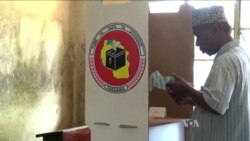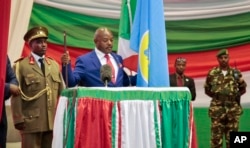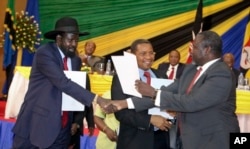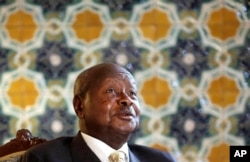The year 2015 was defined by both highs and lows for democracies across Africa, complete with elections, coup attempts, constitutional changes, and peaceful transfers of power.
Nigeria saw its first democratic transition of power in April, when 72-year-old former general and military dictator Muhammadu Buhari defeated incumbent president Goodluck Jonathan. The polls ended 16 years of one-party dominance for the continent’s most populous nation.
In Tanzania, President Jakaya Kikwete stepped down after his constitutionally mandated two terms. John Magufuli was peacefully elected in October after a spirited campaign. The former public works minister demonstrated his dedication to abolishing waste and reducing poverty by shoveling leaves and trash to mark Independence Day after canceling the usual festivities.
Some positive signs
Benji Ndolo, founder and director for the Organization for National Empowerment – ONE, believes this is a positive sign for the region.
“The new president, Magufuli, he’s just started on a wonderful, wonderful note, full of energy, full of optimism, full of action, less talk, so this again is very heartening, especially for countries like Kenya that are just next door, and for the region,” Ndolo said. “Uganda goes for elections in about another month-and-a-half."
Burkina Faso dodged a coup attempt in September and went on to elect the country’s first new leader in 27 years.
Roch Marc Christian Kabore won the presidency by a clear majority in a field of 14 candidates. It marked a successful end to the transition after mass protests ousted longtime President Blaise Compaore in October 2014.
“I would say that in terms of what we can see and the lessons we can learn in terms of democratic progress, is the progressive rise of a responsible society, a society of citizens. You know, the quality of the political offer also depends on the demand and this missing link is progressively coming by,” said Cote d’Ivoire sociologist Fahiraman Rodrique Kone.
But for these highs, there were also lows.
Burundi descended into chaos in April after President Pierre Nkurunziza made his bid for what critics say is an unconstitutional third term in office. After a May coup attempt, protesters taking to the streets, and bloody police crackdowns, Nkurunziza was re-elected in July under a haze of suspicion.
Nearly 200,000 people have fled the country.
The U.S. has put sanctions on four senior officials – both from the government and from the coup organizers – while the U.N. Security Council has condemned killings and torture.
Violence has continued
In South Sudan, tens of thousands have been killed and more than 2 million have fled their homes since civil war flared up two years ago. Supporters of both President Salva Kiir and rebel leader Riek Machar have accused each other of violating a cease-fire agreement.
The peace deal called for an interim administration to be in place by late November, but these plans were delayed. The new target for a transitional government is mid-January.
Protests turned violent in the Republic of Congo as President Denis Sassou Nguesso held an October constitutional referendum to remove a two-term limit and the age ceiling of 70. He won with 92 percent of the vote, raising suspicion among international observers.
And in the Democratic Republic of Congo, President Joseph Kabila is accused of postponing the presidential election, originally set for November 2016, and attempting to amend term limits.
Rwanda voted a resounding yes, with 98.4 percent of the vote, in a recent constitutional referendum to allow President Paul Kagame to run for a third term in 2017, and possibly two more after that.
However, Eric Manga, a researcher at the University of Nairobi, thinks Africa would be better off building up institutions instead of allowing presidents to cling to power for decades at a time.
“It is high time Africans should forget about this issue of laying their destiny with individuals,” Manga said. “You know that we will always have good ones and bad ones, but you know, if we have strong institutions, we will be in the position to take the right path.”
Uganda’s President Yoweri Museveni is expected to be re-elected in February, extending his 30 years in power.
“What we want to see out of Africa going forward is more stories of self-determination, more stories of less debt, of responsible leadership, of an uplifting of a majority from poverty, not just a few guys at the top,” Ndolo said.
In 2016, African democracies will face another test, with key elections and referendums expected in at least nine countries, including Uganda, Zambia and Ghana.
Emilie Iob contributed reporting from Abidjan.









